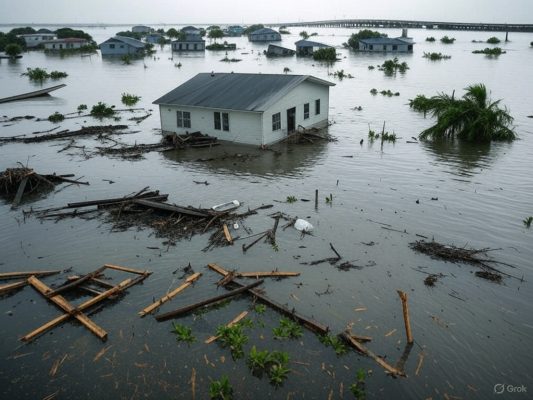ENVIRONMENT

RISING SEA LEVELS COULD SUBMERGE NIGER DELTA COASTAL COMMUNITIES BY 2050
Environmental experts have issued a stark warning that numerous coastal communities in Rivers State and the wider Niger Delta region face a serious threat of disappearance by 2050 unless immediate steps are taken to enforce environmental protection laws.
This concern was raised during a workshop on Conflict in Coastal Communities held in Port Harcourt, organized by Academic Associates Peace Works (AAPW) and funded by the European Union’s C7 project.
At the event, AAPW’s Executive Director, Dr. Judith Asuni, highlighted the severe impact of climate change on the Niger Delta, noting that rising sea levels and frequent flooding have displaced many residents and heightened competition over shrinking resources, thereby exacerbating communal conflicts.
The workshop underscored the alarming consequences of climate change, including increased tides and rising seas, which have forced numerous host communities to relocate, sparking recurrent land disputes and escalating communal tensions.
Nkoyo Toyo, Deputy Director of AAPW, stressed the urgent need for strict enforcement of environmental regulations to combat land encroachment, protect aquatic biodiversity, and address climate-driven migration.
“The coastal region, spanning hundreds of kilometres, is a fragile ecosystem under threat from multiple angles, with climate change being among the most critical,” Toyo said.
“Environmental degradation is directly linked to the unregulated practices of oil companies operating in the region. Nigeria’s failure to regulate emissions and enforce environmental standards has worsened the crisis,” she added, citing the black soot pollution in Port Harcourt as a visible consequence.
Toyo warned that environmental degradation is contributing to migration and scarcity of resources, both of which heighten the risk of violent conflict.
“When people are displaced and resources become scarce, tensions rise. You cannot address conflict without addressing environmental and climate issues, they are interconnected,” she noted. She also called for a holistic approach to environmental enforcement, involving community leaders, policymakers, and security agencies.
Traditional conservation practices, such as seasonal bans on fishing by local communities to protect mangroves, were cited as examples of grassroots efforts that are increasingly undermined by external actors.
The workshop also explored how the Petroleum Industry Act (PIA) could be utilized to fund infrastructure projects aimed at protecting vulnerable communities from the effects of rising sea levels and flooding.
Nimi Elele, representing the Rivers State Ministry of Environment’s Climate Change Desk, echoed the experts' concerns, warning that without urgent action, entire communities risk disappearing.
“During the rainy season, rising sea levels cause severe flooding that damages infrastructure and forces residents to migrate inland, exposing them to increased social risks such as child molestation and sexual abuse.
“Fishing yields have also declined sharply, driving many coastal inhabitants into poverty and hunger,” she explained.
Participants from Bayelsa, Akwa Ibom, Cross River, Delta, and Rivers States appealed for immediate government intervention. They also emphasized the need for stronger public awareness campaigns to educate communities about the causes and impacts of climate change and called for the adoption of sustainable policies to protect their communities and future generations.
"This represents a significant development in our ongoing coverage of current events."— Editorial Board









